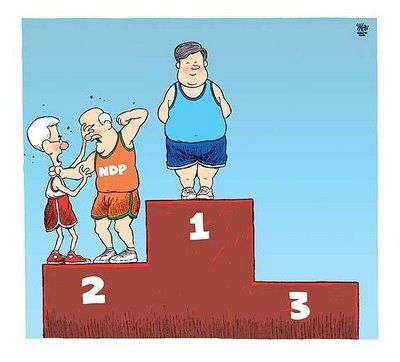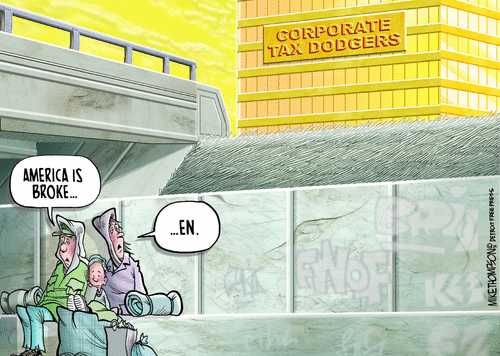 Voters in Canada went to the polls Monday and returned Conservative Stephen Harper government to power with a 10 seat majority in the Parliament. While the most successful party since Canada became a country, the Liberal Party, was relegated to third place, making way for the new left, the New Democrats, taking position as the opposition party.
Voters in Canada went to the polls Monday and returned Conservative Stephen Harper government to power with a 10 seat majority in the Parliament. While the most successful party since Canada became a country, the Liberal Party, was relegated to third place, making way for the new left, the New Democrats, taking position as the opposition party.
Separatist Bloc Quebecois was decimated, holding onto only two of its 47 seats and the defeat of its leader, Gilles Duceppe.
Michael Ignatieff, a former Harvard professor and one of Canada’s leading public intellectuals, says he is stepping down as leader of the Liberal Party after a crushing defeat. The Liberals dropped to 34 seats from 77. Ignatieff even lost his own seat in a Toronto suburb.
The New Democratic Party won 105 seats, well above its previous record of 45.
So, just WTF happened? How did the unpopular Conservatives not only retain power but increased it? How did the Liberal Party fall so far? Simple answer, the Liberals failed because they threw their base under the bus. This article from Jeremy Bloom at the blog, Red, Green & Blue gives this clear, simple explanation:
Canadian Election: WTF happened? “You have to outrun the bear” and other iron laws of politics
You know the classic story: “I don’t have to outrun the bear, I just have to outrun you”?
When you have a shotgun, you turn the shotgun on the bear. You do NOT turn your shotgun on your buddy.
Iggy (Liberal Leader Ignatieff) had a choice in the final week as his party faded. He could have said “Let us show a united front and block the Tories by any means possible.”
Instead, he went the route of “OMG! Scary socialists! Be afraid! Be VERY VERY AFRAID!”
Needless to say, this did not slow down the bear. The bear just kept on coming.
Nor did it stop the Liberal bleeding. The last days of the campaign are the time for you to be solidifying your support with the positive message of why your supporters are voting for you (and no, this is not a winning message either:”Vote for us because we used to be awesome, and we might be again some day! Uh…. Vote for us because your dad did!”)
Snip
. . . .when the faltering Liberal support broke in the final days, it didn’t go to their natural ally, Jack Layton (NDP leader). Instead, it went to pad the Tories (Conservatives).
Mistakes were made
And Iggy made them:
Letting the Tories define him and the issues (Why on earth was he still talking about coalitions last week? That was Harper’s dream issue)
Forcing an election with lousy numbers and no theme or message
Banking right (EG Afghanistan, the oil sands) when the right was a monolithic, efficient fortress he was never ever going to break and the flank he needed to shore up was his left
When the collapse came, lashing out against his ally instead of unifying
Now, Iggy says he’s sticking around. Which just further proves the man has absolutely no political sense whatsoever.
One bright spot: The fact that the Tories have an outright majority saves us from the ultimate indignity: Iggy pandering to Harper, propping up a Conservative minority in the name of “Giving the party time to rebuild” that would actually merely cement their irrelevance.
This is a cautionary warning for the Democratic Party and President Obama who keep pandering to the Tea Party Republicans and throwing the Liberal base under the bus. They are going to make themselves irrelevant in 2012 which might not be a bad thing in the longer run and the election in 2014 and 2016.

 Alex Seitz-Wald:
Alex Seitz-Wald:
Recent Comments